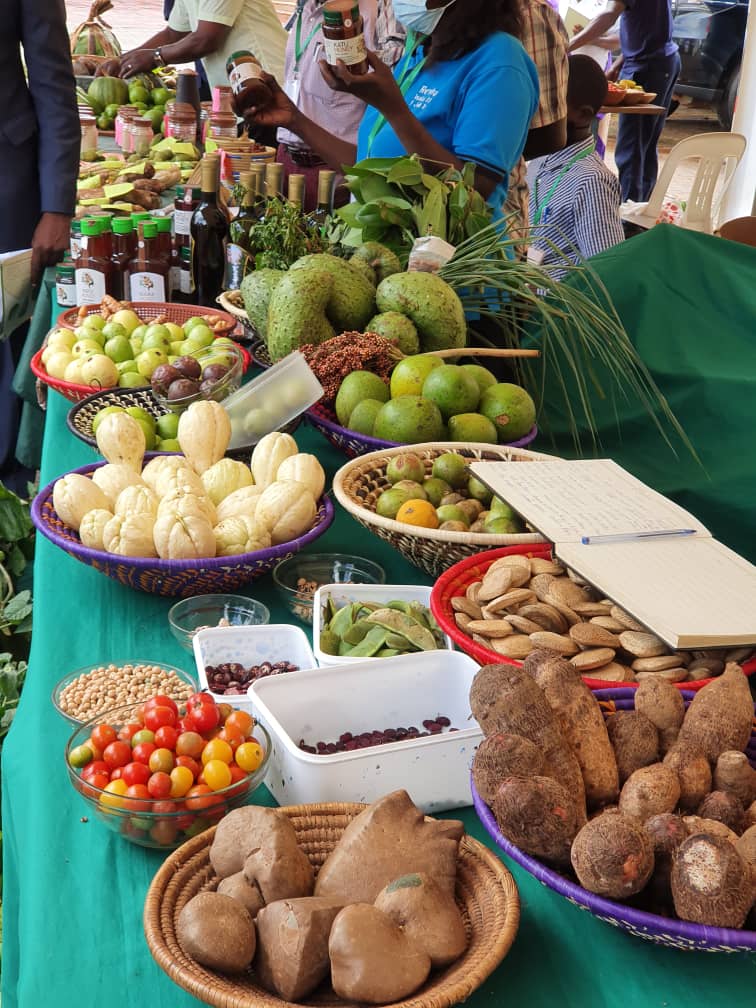Uganda urged to pitch for organic produce during NAM Summit
 Some of the indigenous foods on display at the fair
Some of the indigenous foods on display at the fair
Globally second-ranked organic agriculture producer and African leader Uganda, should use the upcoming Non-Aligned Movement NAM, and G77+China summits, to showcase her products to delegates and expand market opportunities, argue Chariton Namuwoza, the chief executive officer of the National Organic Movement of Uganda; and Sir. Bob George Sunday, the Senior Agricultural Officer, Food Security & Focal Person, Organic Agriculture, in the Ministry of Agriculture, Animal Industry and Fisheries.
Speaking to the media today, the duo said that the back-to-back summits which kick off this weekend at Speke Resort Munyonyo, should be used by the hosts “to underscore the fact that Uganda is home to a broad range of safe, healthy and organic foods and better still, serve the delegates with organic dishes.
“We call upon the private sector – hotels and restaurants to cook and serve organic food for our guests during the two summits. To our guests, please feel at home and enjoy Organic Uganda,” Namuwoza and Sir Bob George Sunday, said in a joint statement.

Sir Bob George Sunday (left) and Chariton Namuwoza
Organic farming is the production of food without the use of synthetic and harmful chemicals such as pesticides, fertilisers, livestock feed additives, or genetically modified components. Organic farming relies on alternative farming methods including crop rotation, mechanical cultivation, use of animal and green manure, and integrated pest management.
According to NOGAMU, the twin summits provide a rare platform for Uganda to showcase the impressive progress registered in the sector over the years and, position the country as the source of premium quality organic products.
Namuwoza who also doubles as the president of the African Organic Network AfrOnet, observed that while organic agriculture has been a major production system in Uganda formal certified organic agriculture started in 1993 with cotton and chili in Northern Uganda. Production which started with roughly 10,000 farmers, has since expanded into a major system with 0.4 million farmers working on half a million hectares.
This has propelled Uganda into the country with second highest number of organic farmers in the world and the highest number in Africa. It also has the largest land area under organic agriculture in Africa. The three years between 2018-2021 say the fastest growth of the industry in Uganda with a 91pc increase in the number of certified organic farmers, to 404,000; a 90pc increase in the total acreage of certified organic land, to over 500,000 ha.
Certified land under organic production is expanding 15pc annually, while organic exports increased 40pc to USD174 million. Organics now account for 12pc of Uganda’s agricultural exports. Uganda is the 28th largest exporter to the EU, accounting for 0.7pc of all organic imports into the EU.
Global production and trade in organic agricultural products is expanding rapidly, with the EU and USA leading in consumption. The global market for organics which was only USD 30 billion in 2000 is projected to reach USD 367 billion by 2026.
“The current trends reflect a changing world and new consumption patterns. There is growing preference for hazard free food, greater consciousness of the importance of climate change, and growing concern about the health hazards of agrochemicals, which are together inspiring increased demand for organic food,” Namuwoza said adding that Uganda was in a good position to take advantage of these changing trends because her agricultural system is by default organic due to minimal use of external inputs like fertilisers and pesticides.
“The use of chemical fertilisers in Uganda is one of the lowest in the world. Uganda has the second highest number of organic farmers in the world and the largest area under organic agriculture in Africa. This gives great potential for organic agriculture for increased and sustainable food production and enhanced farmer income. Yet, Uganda is only responsible for less than 5pc of global organic food exports at a time when unmet demand in the EU alone is estimated to be Euro500million. EU. This performance needs to improve.”
Over the past three decades production and trade of organic products from Uganda have expanded from cotton and chili and now include coffee, cocoa, sesame, vanilla, chia, sunflower, fresh and dried fruits, apple banana, mango, jack fruit, passion fruit, tomatoes, onions, ginger, papaya herbs, honey, sugar, oils, eggs, local chicken and fish, among others.

 African Heads of state head to South Korea next week for Summit talks
African Heads of state head to South Korea next week for Summit talks
 Trading leads as main source of income for Ugandans
Trading leads as main source of income for Ugandans
 New leadership for bankers’ umbrella as total assets top $12 billion
New leadership for bankers’ umbrella as total assets top $12 billion
 Brussels Airlines to announce Nairobi service
Brussels Airlines to announce Nairobi service
 SITA promises enhanced travel experience after Materna acquisition
SITA promises enhanced travel experience after Materna acquisition
 Saudia’s 105 aircraft order stretches A320neo lead over rival Max
Saudia’s 105 aircraft order stretches A320neo lead over rival Max
